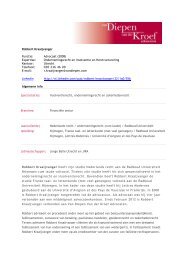Writ of summons - Van Diepen Van der Kroef
Writ of summons - Van Diepen Van der Kroef
Writ of summons - Van Diepen Van der Kroef
You also want an ePaper? Increase the reach of your titles
YUMPU automatically turns print PDFs into web optimized ePapers that Google loves.
‘militairement avait mal conduit.’[Lawyer’s translation:in military terms had failed.]445. The then Cabinet un<strong>der</strong> the premiership <strong>of</strong> Prime Minister Kok resigned following thepublication <strong>of</strong> the NIOD Report in April 2002. In his explanatory memorandum to thedecision to resign Kok stated that the Government wished ‘to manifest the politicalcontributory responsibility’ for the situation. Kok also stated that the internationalcommunity had failed in the protection <strong>of</strong> the persons in the Srebrenica Safe Area(statement <strong>of</strong> Kok <strong>of</strong> 16 April 2002 to the Speaker <strong>of</strong> the Lower House). In Kok’s viewthe international law apect <strong>of</strong> the case exonerated The Netherlands (it was not the stateproviding troops that was responsible but the UN). It has already been addressed abovethat The Netherlands itself repeatedly exercised effective control and that the questionwho <strong>of</strong>ficially exercised command and control is irrelevant. That Kok’s internationallaw approach is incorrect follows, for example, also from the earlier statement <strong>of</strong>Minister Voorhoeve (see, page 2283 <strong>of</strong> the NIOD Report):‘The Minister <strong>of</strong> Defense, Voorhoeve, adopted the position with NIOD that these rulesrelating to Command and Control in The Netherlands, and the question where theindividual responsibilities lay, was more or less clear, but that in practice it transpiredthat it was not possible to separate these sorts <strong>of</strong> matters, with the result that theybecame entwined. In his view, it was possible to argue logically in pure publicinternational law terms that The Netherlands had placed contingents at the disposal <strong>of</strong>the UN, and that The Netherlands only retained the right to recall those contingents butthat otherwise everything was a matter for the UN. To this The Hague would say: thesesoldiers are now UN blue helmets, and consequently this is not our problem. But that’snot how matters were in practice, said Voorhoeve.’446. In a letter <strong>of</strong> 30 September 2004 to the Bosnian lawyers <strong>of</strong> Plaintiff, the State <strong>of</strong> theNetherlands maintained the position that the premises un<strong>der</strong>lying the UN resolutions didnot reflect reality. In particular, the VRS would not be overly concerned about its© <strong>Van</strong> <strong>Diepen</strong> <strong>Van</strong> <strong>der</strong> <strong>Kroef</strong> Advocaten 2007www.vandiepen.com185
















